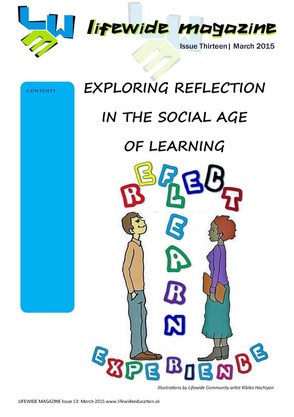
Issue 13 focuses on reflection - more specifically on how we reflect in the age of social media.To be honest, I never thought much about reflection in educational practice until I got involved in helping to create a policy that would encourage and support the introduction of Personal Development Planning (PDP) into higher education. I soon realised that PDP would become a vehicle for systematically embedding reflection in the educational experiences of all students in UK higher education.
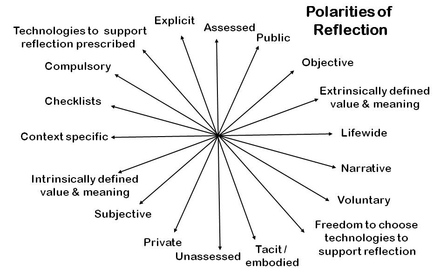
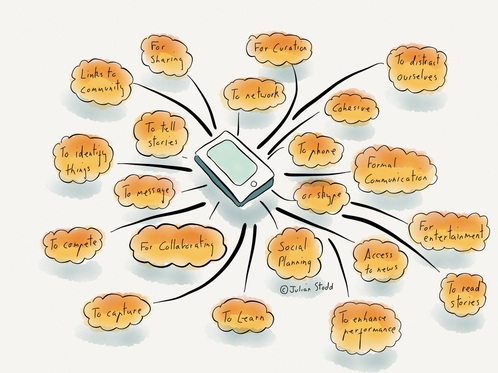
Everyone reflects, it's an important part of what makes us who we are and helps us sustain our beliefs and confidence. It enriches our capacity to learn from our experiences but much of it goes unnoticed as we go about our daily lives. Reflection is an integral part of our self-regulatory mechanism for ensuring that we survive and thrive. But in many professional roles we have turned reflection into an instrument for accountability and perhaps, in the process, given up some of the freedom and intrinsic motivations we have for exploring our experiences, our practices and ourselves. We have to be very careful in higher education not to stifle intrinsic desires for reflective space and the need for the continued development of personal narratives, through efficient, mechanistic exercises that reduce everything to tick box answers.
In UK higher education we have embedded and systematised reflection in the practice of Personal Development Planning which has been implemented in many different forms over the last fifteen years. Rob Ward, who has made PDP his life project, asks the question, 'what impact is the Social Age having on PDP practice?
Reflection is inherently about creation since we create new understanding through the thinking process that causes us to pay attention to the detail of what we have learnt in one situation, that might be applied in future in another situation. The new insights we gain through reflective thinking gives us the confidence to put ourselves into new unfamiliar situations which in turn will demand our creativity. Furthermore, reflective thinking may motivate us to make artefacts to record or document our experiences and represent our learning for example in diaries, scrapbooks and blogs, and this perhaps is where social media plays an increasing role.
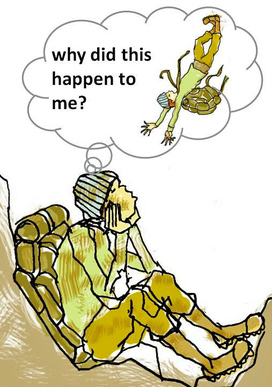
Most people reflect on experiences and events in their lives but they do so privately, informally and without a record. This general tendency carries over into the use of social media - even active users of social media typically do not use these media for recording self-reflection. So being an active user of such media does not in itself mean that people will use their affordances for reflection and recording reflective thinking. People who voluntarily record their reflective thoughts, in a diary, letters, blogs and through other means, do so because of the intrinsic value and meaning they derive from the process. For them reflection is a part of who they are and an outlet for their creative self-expression. They will search for and use the medium(s) that enable them to best express their reflective thoughts in words, drawings, paintings, photographs, making things. If they use social media then they will consider the affordances they offer.
Generally, people spend time and effort recording their reflective thoughts only when they are expected or required to do so. For example, in work reports, training and development activities or appraisal procedures, or in formal educational processes. They might also reflect and record their thinking at important transitions in their life for example when they are considering leaving a company or applying for a job and they have to update their CV or write a letter of application. In other words reflection is fulfilling a particular purpose and the parameters are usually externally defined. People engage in reflection when they are involved in learning projects, CPD activities or a new and rich informal learning experience, such as travelling or living in a new country. They might also engage in reflection and recording their thinking for therapeutic reasons for example following trauma.
The people who do spend time and effort recording their thinking, including their reflective thoughts, over sustained periods of time, are people who are interested in and committed to their own learning and development. Typically such people are involved in the development of others - teachers, trainers, coaches, educators, developers and one of their purposes is to lead by example by showing the value of recording their reflections.
In addition to people who are directly involved in education, there are groups, such as Professional Bodies, that have a particular interest in promoting formal reflection through their role in professional recognition and the maintenance of good standing through self-managed CPD. This connects reflective practice in education with reflective practice in the professional world.
Yet another group of people who record their thinking in a publicly accessible way are the thought leaders and writers, who want to influence others, build their reputation and promote themselves in the process.
You have to be an active user of social media in order to make use of its affordances for supporting reflection. Personal blogs using web 2.0 platforms like wordpress, tumblr and weebly, are the preferred social media tools for making reflective thinking publicly available - often supported by Twitter. But people who are highly involved in social media make use of many different tools in their reflective processes, curation and sharing practices. It's also clear that some people have tried to use social media to encourage reflection and have been disappointed with the results. These tools did not help them reflect deeply and meaningfully.
Virtually, all the contributors to Issue 13 of the Magazine maintain a blog through which they publish, amongst other things, their reflective thoughts. Their blogs are connected to their purposes - usually their role, specific aspects of their work or other enterprises they are involved in or perhaps their passions.
So on balance, it would appear that social media provide a medium for recording and presenting reflective thinking for those people who want to reflect and are interested in using such media to accomplish this. But it probably has little impact on people who do not see the value in recording their reflective thoughts.
But we must also be aware that reflective thinking that is publicly shared through social media reveals only part of an individual's reflective story and its purpose is primarily not to codify the learning of the individual for themselves but to present such codification to others.
In providing me with some useful feedback on my article, John Cowan highlighted the fact that people rarely admit mistakes/failure or messing up in their blogs preferring to present themselves in a more successful light. Whilst I agree with this generalisation I don't think its all that different to reflective writing in an assessed portfolio be it for claims of student or professional learning. Unless of course people deliberately set out to focus on critical incidents and mistakes.
I don't encounter many blogs or diaries or social media postings that record mistakes, weaknesses or causes for worry, except when they also record that the writer has these in hand. When I read such entries, I find myself asking myself, "What is this writer trying to sell me about himself or herself? And why?" Me, I reflect for me. On the many occasions when I make these efforts available to others, I am simply trying to share with them that this man can and has found it useful to be personally probing in frank reflections. Professor John Cowan (pers comm)
Regardless of whether we perceive social media to be of use in personal reflection, social media are good at helping us share our reflective stories and insights. When I start researching a new topic I will often search for blogs where people have shared their own thinking and ideas. By sharing their creative contributions people help other people to think: people they will never know unless they make a comment on their blog. Seeing someone else make use of your thinking and creative products can be highly motivating and encourage you to share even more - but all too often people do not leave comments so we do not know what effect our sharing has.
But to be brutally honest I rarely receive any comments on blog posts and my most successful engagements which foster reflective dialogue have been through email, where I have invited someone I trust to provide me wi h their perspectives on thoughts I have shared.
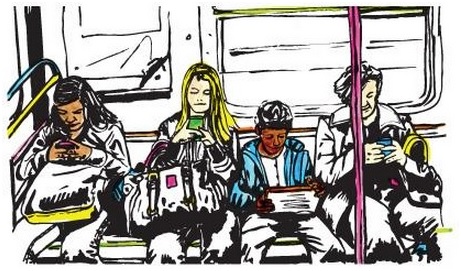
It is also worth reflecting on the very real danger, in a world where people are constantly immersed in using technology and constantly consuming and creating media products, that time for and interest in reflection gets squeezed out. Perhaps also much of the information flow is designed to encourage us to accept the message without critique. So what is the point of having new affordances for reflection if our desire to utilise those affordances gets overwhelmed or surpressed by other possibilities: possibilities that are perhaps more enjoyable to enact than reflecting on past experiences, some of which might be far less enjoyable to relive.
As Marsha Bernstein (4) so eloquently puts it - 'there is no app for knowing yourself'8. Her concerns in a world of constant social media consumption is that her children have little time or inclination to be 'alone with their thoughts and feelings -- the happy ones, the dreamy ones, the uncomfortable ones, the ones they want to get away from. Those moments that allow us to get to know ourselves, all parts of ourselves, not just the likes and dislikes or how our Facebook profile pic looks. How will they engage in any self-reflection or inner mining if they're in a constant loop of Vine videos and Starbucks selfies?'8
For those of us who have learned the value and necessity of reflective habits I suppose we are all learning how to design and manage our lives in the new social order and it might take time for us to adjust and understand how social media and other web 2.0 technologies can best assist our reflective thinking processes.
For those who have yet to discover the value and necessity of reflective habits we need to recognise that in spite of the many wonderful opportunities and affordances web 2.0 and social media provide, it is still important to help learners develop the skills and attitudes that will help them develop the habit of creative and critical reflection.
But ultimately, and regardless of technological innovation, and whether we record or do not record our reflective thoughts, we all need to find the time and space to think and explore and challenge our own beliefs, assumptions and prejudices in order to become the sort of person we want or need to be.
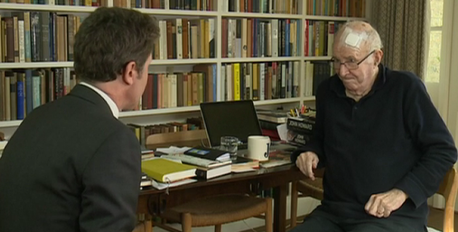
Leçons De Ténèbres
But are they lessons, all these things I learn
Through being so far gone in my decline?
The wages of experience I learn
Would service well a younger life than mine.
I should have been more kind. It is my fate
To find this out, but find it out too late.
In the conversation that followed, Clive James admitted, 'I wish I had been wiser earlier, but now that I am being as wise and comprehending as I can be about my life. I have something to go on, to be grateful for.' Through sharing his thoughts he provides us with a glimpse of how reflection features in the later stages of our life as we look back and think about what might have been, but are thankful for what has been. This is one reflective process the Social Age will not change.
Acknowledgements
My thinking greatly benefited from conversations with Professor John Cowan, Chrissi Nerantzi and Sue Beckingham. You can access Lifewide Magazine at http://www.lifewidemagazine.co.uk/
Reference
1 James, A. and Brookfield, S. D. (2014) Engaging Imagination: Helping students become creative and reflective thinkers Jossey Bass
2 Stodd, J. (2014a) Exploring the world of social learning. Smashwords Available at:
https://www.smashwords.com/books/view/204432
3 Stodd, J. (ed) (2014b) Lifewide Magazine September 2014 Exploring the Social Age and the New Culture of Learning Available on line at: http://www.lifewidemagazine.co.uk/
4 Bernstein M (2014) Knowing Yourself: There's No App for That. Huffington Post
http://www.huffingtonpost.com/marsha-lebedev-bernstein/knowing-yourself-theres-no-app-for-that_b_6057042.html
Interview
BBC Breakfast TV interview with Clive James 31/03/15 06.53am
http://www.bbc.co.uk/iplayer/live/bbcone
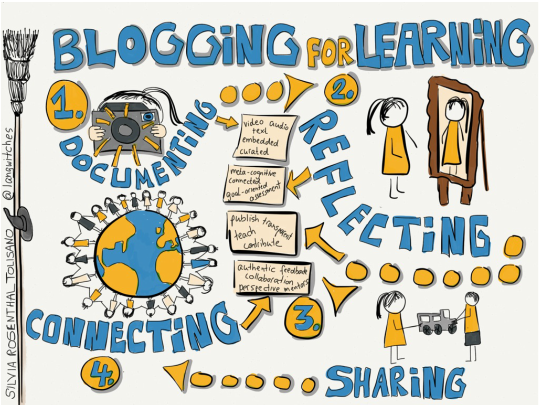
 RSS Feed
RSS Feed
